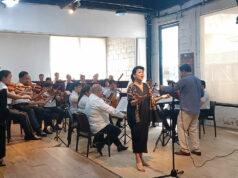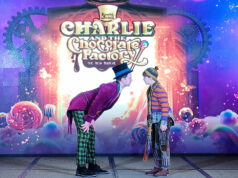Cine Europa ends this year’s run at Shangri-La Plaza, offers free lectures and screenings of 27 films
FILIPINO film historian and award-winning movie maker Nick Deocampo will be giving a series of free lectures from Dec. 12-14 at the EDSA Shangri-la Plaza’s newly opened Red Carpet cinema as part of the Cine Europa film festival which is ongoing until Dec. 16 at the mall.
Mr. Deocampo will be giving lectures on the 100th anniversary of Philippine cinema and its European influence; understanding culture through film: hidden camera for the 100 years of Philippine cinema; and the growth of regional cinema in promoting cultures.
The festival, which kicked off its 21st year on Sept. 28 in Cebu, has travelled around the country, with stops at Naga, Iloilo City, Tacloban, Puerto Princess, Leyte, and Baguio, and culminates in Metro Manila.
Cine Europa is part of the cultural diplomacy between EU and the Philippines said EU Ambassador Franz Jessen in a statement, adding that “Cine Europa is one of the most effective means for the EU to reach out to the Filipino people. It is a unique way to showcase European cultural diversity in the Philippines.”
THE FILMS
The longest running international film festival in the country, Cine Europa present 27 movies from 15 countries this year.
Austria’s Mademoiselle Paradis (2017), directed by Barbara Albert, is about a blind piano virtuoso who regains her sight at the cost of her talent, Clara Stern’s Mathias (2017) about a transgender dealing with transition, Siegfried A. Fruhauf’s Fuddy Duddy (2016) about an event much like the Big Bang which brings both order and chaos, and Jannis Lenz’ Wannabe (2017) about a young YouTuber who wants to become famous.
Belgium presents three films: Allez, Eddy! (2012), directed by Gert Embrechts, about a butcher’s son who joins a cycling race, Upstream (2016), by Marion Hansel, about two men who discover they are half-brothers; and Germaine (2011), by Frank Van Mechelen, about an 18-year-old whose life changes when workers at a local factory, including her father, decide to go on strike.
Meanwhile, the Czech Republic presents Closely Watched Trains (1966) by Jiri Menzel, about an apprentice train watcher who gets seduced into join the Resistance forces during the Second World War. The film won the Best Foreign Language Film award at the 1968 Academy Awards. For it’s contemporary offering, the Czech Republic presents To See the Sea (2014) by Jiri Madl, about a ten-year-old boy who receives a video camera for his birthday and uncovers a big family secret.
Denmark’s Zentropa (1991), by Lars Von Trier, focuses on a young German American who gets embroiled between the power elite and Nazi terrorists gone underground after Germany’s surrender, while The Day Will Come (2016), by Jesper W. Nielsen, tells the story of two brothers who are placed in a boy’s home where, armed with their imagination and hope, they struggle through the headmaster’s tyranny.
A Taste of Ink (2016) by Morgan Simon is one of France’s entries to this year’s film festival. It is about a singer who falls for his father’s new girlfriend. France will also present Crazy Pierrot (1965) by Jean-Luc Godard, about Pierrot and a girl named Angela leading an unorthodox life on the run.
Germany’s only entry, Windstorm and the Wild Horses (2017) by Katja von Garnier, is about a horse whisperer who wants to revive a wild horse race tradition.
Hungary enters the festival with The Exam (2011) by Peter Bergendy. Set during the country’s 1956 revolution, a national security officer is tasked to gather information and whose secrets can destroy both his career and that of his superiors.
Italy comes to Cine Europa with an Italian-Filipino collaboration called The Lease (2018), directed by Paolo Betrola. It is about a Philippine-Italian family who live in the Philippines and discover that their newly leased villa in Tagaytay is haunted.
Another Italian film, Notti di Cabiria (1957) by Federico Fellini, is about a woman who was robbed and left to drown by her boyfriend. Rescued, she decides to resume her life and find happiness.
From the Netherlands comes Winter in Wartime (2008) by Martin Koolhoven, about a teenager who is tasked to care for a British pilot which brings him to the realization that good and evil are intertwined in times of war.
Norway, the only non-EU member state to join Cine Europa this year, presents 1001 Grams (2014) by Bent Hamer, about a scientist who attends a seminar in Paris on the actual weight of a kilo and spirals into the measurement of how much a human life weighs.
Another Norwegian entry is Operation Arctic (2014) by Grethe Boe-Waal, about three sisters who end up on a deserted island and aside from surviving must figure out how to return.
Poland will present Marie Curie and the Blue Light (2016) by Marie Noelle, about the Nobel Prize winner who, after winning the prestigious prize has to deal with the death of her husband and being a widow and take care of her two daughters while continuing the work she began with her husband.
Romania’s Selfie 69 (2016) by Cristina Jacob is about three friends going through breakups who bet among themselves about who gets married first. Slovakia gets political with The Candidate (2013) by Jonas Karasek, about the background of a political campaign of a successful presidential candidate.
From Spain comes the classic Bienvenido, Mister Marshall (1953) by Luis Garcia Berlanga, about a little village getting economic aid from the US after World War II and how it welcomes the aid with much fanfare; and Hache (1997) by Adolfo Aristarain, about an Argentinian film director who does not allow himself the luxury of feeling.
Meanwhile, Sweden presents two films: A Holy Mess (2015) by Helena Bergstrom, a comedy about a modern Swedish family and their continual struggle to “do things right,” and Eternal Summer (2015) by Andreas Ohman, a road movie about a couple who travel through the breathtaking landscape of Northern Sweden.
Finally, United Kingdom presents two films: Amy (2015) by Asif Kapadia, a documentary on the life of singer Amy Winehouse; and My Generation (2017) by David Batty, with actor Michael Caine narrating his journey through 1960s London. The film was assembled by Mr. Caine over the last six years. — NPDG/ZBC



